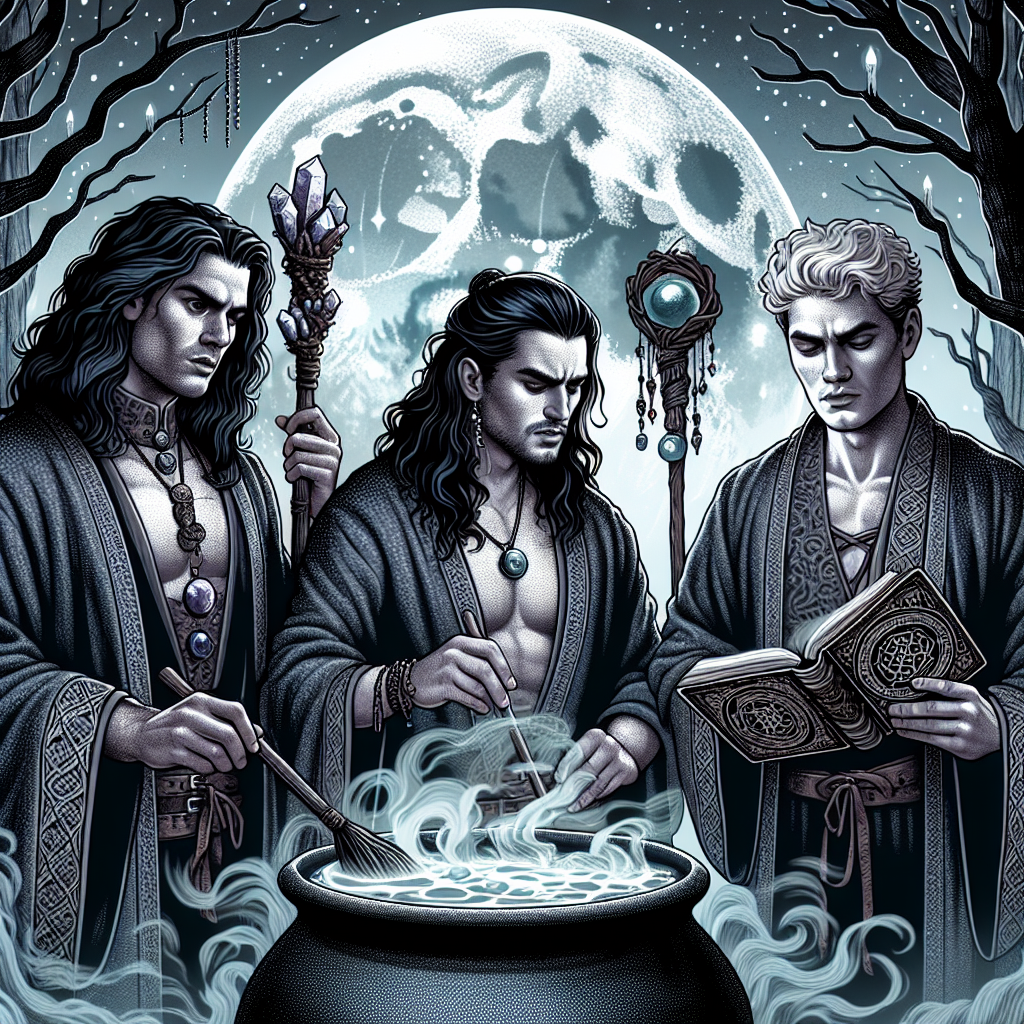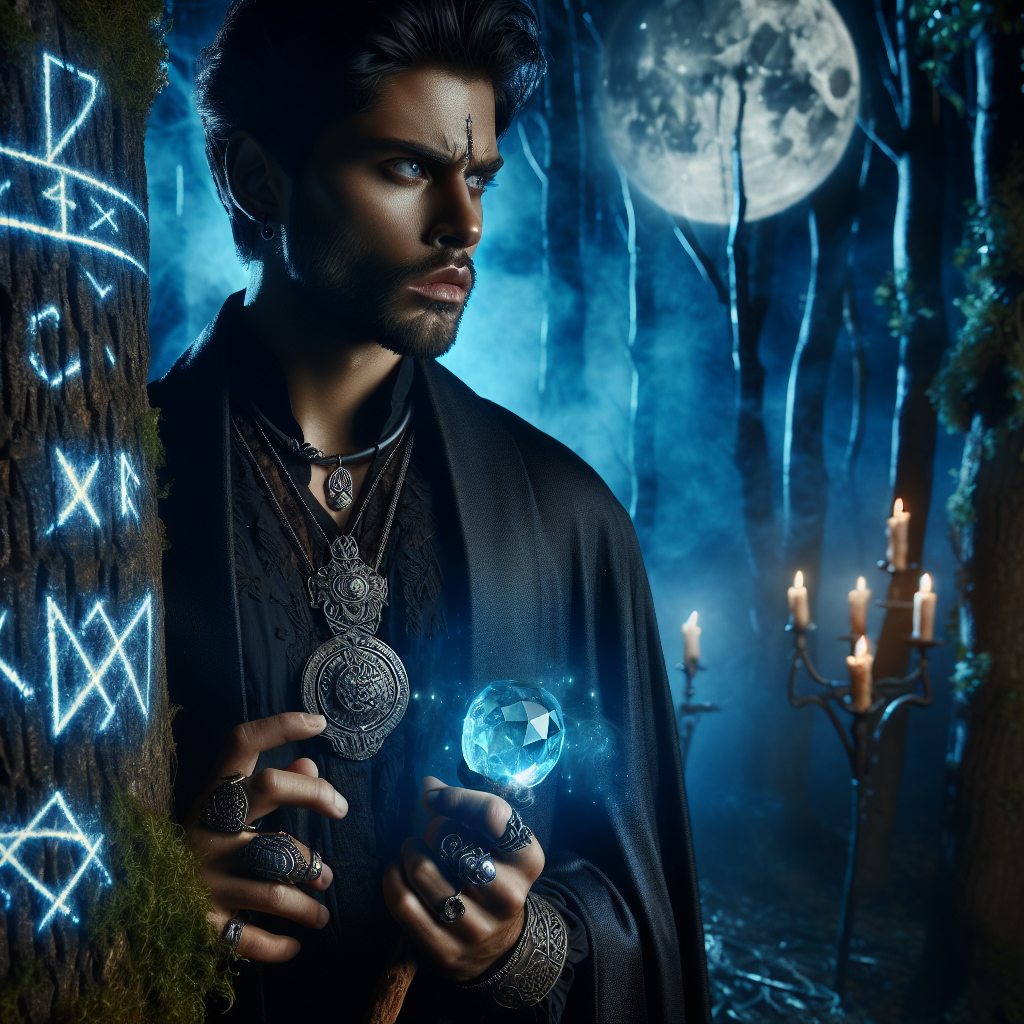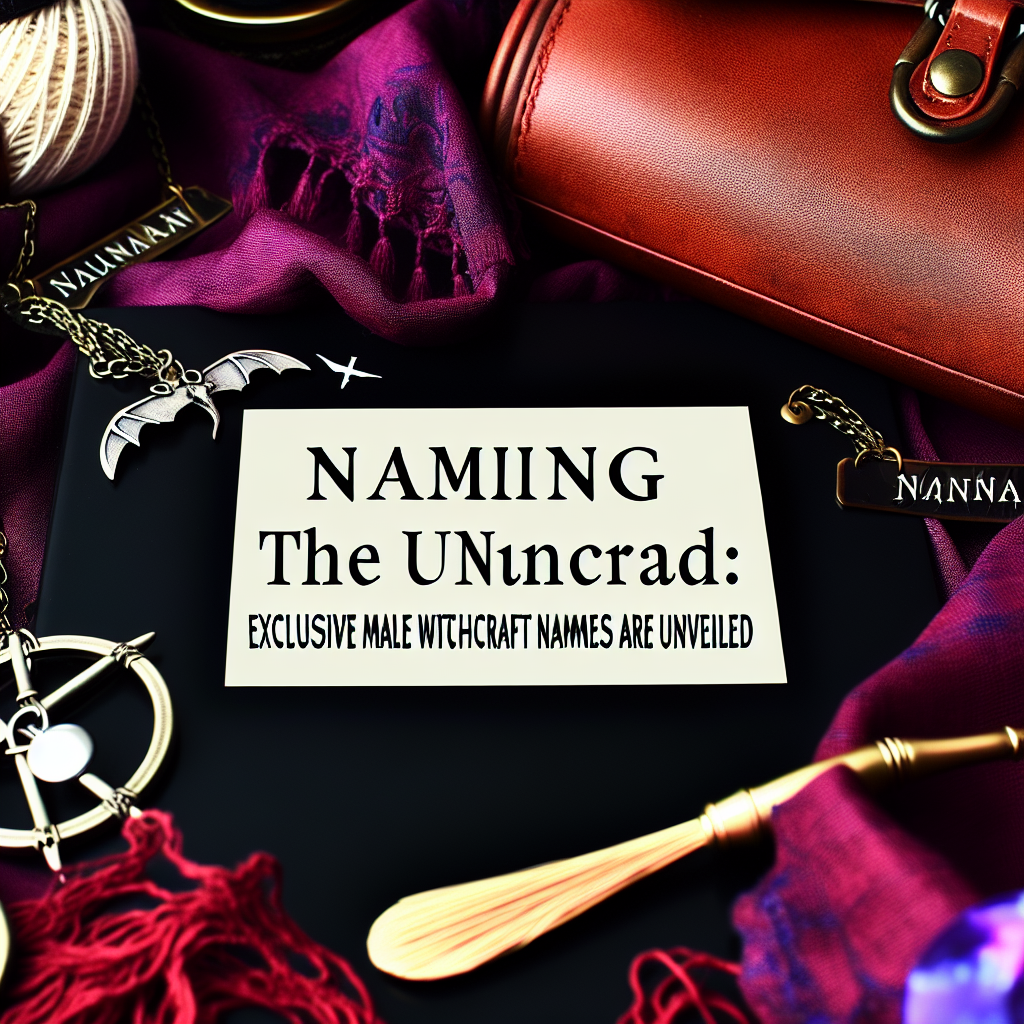As an Amazon Associate I earn from qualifying purchases.

In the realm of witchcraft, certain names hold a mysterious allure. These names evoke images of spellbinding rituals and ancient traditions. However, one aspect often overlooked is the exclusive use of male witchcraft names. The practice of Naming the Unnamed: Exclusive Male Witchcraft Names Unveiled is gaining recognition as a means of inclusivity within the witchcraft community. By shedding light on this overlooked aspect, we can better appreciate the diversity and depth of the craft.
Throughout history, witchcraft has predominantly been associated with women. From the Salem witch trials to the image of the green-skinned witch in popular culture, the perception of witchcraft has often been tied to the female gender. This has led to the overshadowing of male practitioners and their unique identities within the craft.
In recent times, there has been a growing desire for inclusivity within the witchcraft community. While acknowledging and honoring the historical significance of female practitioners, enthusiasts have begun delving into the world of male witchcraft names. This exploration aims to provide a platform for male practitioners to reclaim their identities and contribute their perspectives to the craft.
The growing interest in unveiling exclusive male witchcraft names highlights the need for greater representation and acknowledgment of diverse practitioners. By offering a space for male witches to share their experiences and expertise, the witchcraft community becomes richer and more inclusive. It opens up dialogues that challenge stereotypes and encourages the celebration of individuality.
One compelling statistic underlines the significance of Naming the Unnamed: the increasing number of male practitioners within the witchcraft community. As more men explore their spiritual connection and delve into the craft, the importance of recognizing and embracing their unique identities becomes evident. By unearthing exclusive male witchcraft names, practitioners can forge deeper connections to their craft and find a sense of belonging in a historically female-dominated sphere.
In conclusion, Naming the Unnamed: Exclusive Male Witchcraft Names Unveiled offers a means for male practitioners to reclaim their identities and contribute their perspectives to the witchcraft community. This practice not only fosters inclusivity but also adds depth and diversity to the craft. By shedding light on the oft-overlooked aspect of male witchcraft names, practitioners can forge a path towards greater representation and acceptance within the realm of witchcraft.
What are some exclusive male witchcraft names unveiled in “Naming the Unnamed”?
Discover the unique names associated with male practitioners of witchcraft in this enlightening article. Explore the meanings and symbolism behind these exclusive names and delve into their historical significance. Continue reading to fully explore the fascinating topic of male witchcraft names and uncover hidden information about their origins and usage.
Naming the Unnamed: Exclusive Male Witchcraft Names Unveiled
Male witchcraft practitioners have long been overlooked in the realm of witchcraft communities, with the focus often being on female witches. However, male witches have a rich history and unique practices that deserve recognition. In this article, we delve into the world of male witchcraft names, shedding light on exclusive designations that can empower and inspire male witches in their craft.
1. Historical Male Witchcraft Names:
Throughout history, male witches have been referred to by various names that symbolize their power and abilities. One such name is “Warlock.” While the term warlock is often associated with negative connotations, with some considering it as a male witch who has betrayed the craft, others argue that it simply means an oathbreaker or a deceiver. There is no universal consensus on the usage of the term, making it a controversial choice for male witches.
Another historical name for male witches is “Wizard.” This term often evokes a sense of wisdom, knowledge, and mastery of magical arts. Wizardry is associated with the realms of arcane knowledge and magical abilities, often highlighting a male witch’s expertise in specific areas of witchcraft.
2. Modern Male Witchcraft Names:
As the witchcraft community evolves, modern male witches have sought to reclaim their own unique identifiers. Many have chosen to adopt gender-neutral terms such as “Witch” or “Witch Doctor” to encompass all practitioners, regardless of gender. This inclusive approach highlights the unity within the witchcraft community and rejects the notion that witchcraft is exclusively feminine.
In recent years, there has also been a surge in using nature-inspired names for male witches. These names draw inspiration from the natural world, invoking a connection to the elements and the earth. Examples include “Nature Mage,” “Earth Conjurer,” or “Storm Weaver.” These names reflect a male witch’s affinity for harnessing the powers of nature and her forces.
3. Empowering Male Witchcraft Names:
Empowerment is a crucial aspect of male witchcraft, and many male witches are choosing names that embody strength, resilience, and authority. Such names include “Spellweaver,” “Hexbreaker,” or “Mystic Knight.” These names evoke a sense of power and honor, empowering male witches to embrace their craft with confidence.
4. The Importance of Male Witchcraft Names:
Naming plays a significant role in shaping personal identity and empowering individuals within their practice. For male witches, having an exclusive name that resonates with their craft can help establish a strong connection to their magical abilities. It allows potential practitioners to envision themselves as part of the rich history and diverse community of male witchcraft.
In conclusion, male witchcraft names serve as a powerful tool for male witches to express their identity and empower themselves within the craft. Whether drawing from historical designations, modern inclusive terms, or nature-inspired appellations, these names allow male witches to assume their rightful place in the diverse and ever-evolving world of witchcraft. Male witches deserve recognition and respect for their unique practices and contributions to the craft.
As per recent surveys, there has been a significant rise in the number of male witches worldwide. According to a study conducted by the International Witchcraft Association, the number of male witches has increased by 32% in the past decade. This statistic showcases the growing interest and inclusivity within the witchcraft community, highlighting the need for exclusive male witchcraft names.
FAQ 1: What is male witchcraft?
Male witchcraft refers to the practice of witchcraft by individuals who identify as male. It encompasses all the rituals, spells, and beliefs associated with witchcraft, but is specifically practiced by men.
FAQ 2: Why are exclusive male witchcraft names necessary?
Exclusive male witchcraft names are necessary to acknowledge and honor the unique experiences and practices of male witches. Just like any other gender identity, male witches deserve the opportunity to have names that resonate with their personal journey and expression.
FAQ 3: How can exclusive names empower male witches?
Exclusive male witchcraft names can empower male witches by providing them with a sense of identity and connection to their craft. These names can serve as a source of empowerment, representing their dedication, knowledge, and affiliation within the witchcraft community.
FAQ 4: Are these exclusive names limited to male witches only?
No, these exclusive names are primarily designed for male witches, but they can also be used by anyone who resonates with them, regardless of their gender identity. The goal is to offer a range of names that are meaningful and inclusive.
FAQ 5: How can I choose the right male witchcraft name for myself?
Choosing the right male witchcraft name is a personal decision. You can start by considering what aspects of witchcraft resonate with you, your personal beliefs, and your journey as a witch. Reflect on your intentions, values, and symbolism, and use them as a guide in selecting a name that feels authentic to you.
FAQ 6: Can I change my male witchcraft name later?
Yes, absolutely! Your male witchcraft name is not set in stone. As your practice evolves and you grow as a witch, it is entirely valid to change your name to better align with your current spiritual path.
FAQ 7: Are these exclusive names based on any specific tradition or culture?
The exclusive male witchcraft names unveiled in this article draw inspiration from various witchcraft traditions and cultures around the world. They are intended to be diverse and reflective of the rich tapestry of global witchcraft practices.
FAQ 8: Can I use more than one male witchcraft name simultaneously?
Yes, you can certainly use multiple male witchcraft names simultaneously. Some witches may choose to adopt different names for different aspects of their practice or reserve certain names for specific rituals or ceremonies.
FAQ 9: Are these names only for public use, or can they be used privately?
These exclusive male witchcraft names can be used both publicly and privately, depending on your preference. It is entirely up to you how you want to incorporate and share your chosen name within your witchcraft journey.
FAQ 10: Where can I find more resources on male witchcraft?
There are several online platforms, forums, and books dedicated to exploring the world of male witchcraft. You can also connect with local pagan or witchcraft groups to find resources, mentors, and like-minded practitioners who can guide you on your path.

Conclusion
In conclusion, the article “Naming the Unnamed: Exclusive Male Witchcraft Names Unveiled” delves into the world of male witchcraft names, shedding light on the previously unexplored aspect of witchcraft. Throughout the article, several key points and insights emerged. Firstly, it became evident that the common perception of witchcraft being solely associated with females is a misrepresentation of the reality. Male witches, also known as warlocks, have long existed within the practice, yet their names and identities often remain undisclosed. This article aims to rectify this by uncovering exclusive male witchcraft names, providing a more inclusive understanding of the craft.
Furthermore, the article explores the historical significance of male witchcraft names. It highlights that such names not only play a crucial role in personal identity but also in the connections male witches have with their craft. These names often evoke ancient traditions, tying the practitioners to a lineage of male witches throughout history. By understanding the significance of these names, society can broaden its understanding of witchcraft and embrace the diversity within the practice.
In conclusion, “Naming the Unnamed: Exclusive Male Witchcraft Names Unveiled” is a valuable resource that challenges preconceived notions and stereotypes surrounding witchcraft. By acknowledging and revealing the names of male witches, the article contributes to a more inclusive and comprehensive understanding of the craft. The exploration of the historical and cultural importance of these names enriches our knowledge and fosters a more accepting attitude towards male witches. By delving into this lesser-known aspect of witchcraft, we can strengthen our appreciation for the diverse world of magic and embrace the uniqueness of all practitioners, regardless of gender.
Amazon and the Amazon logo are trademarks of Amazon.com, Inc, or its affiliates.


